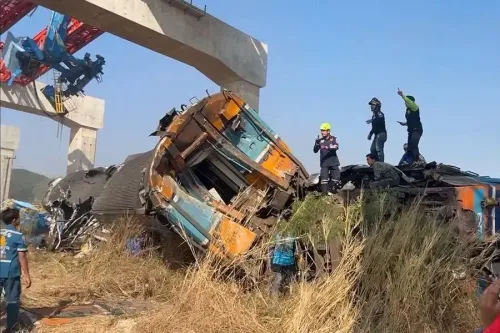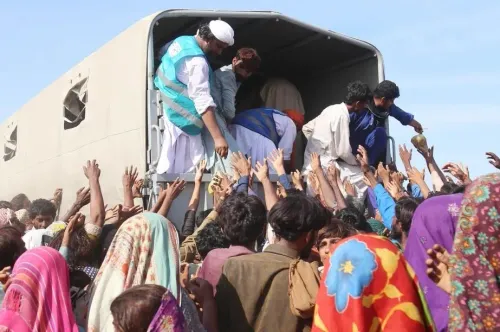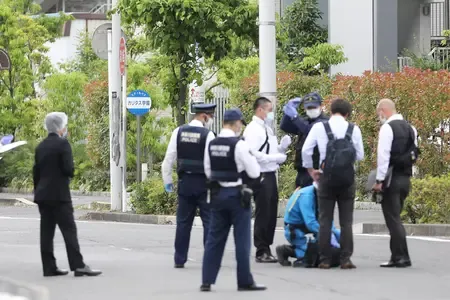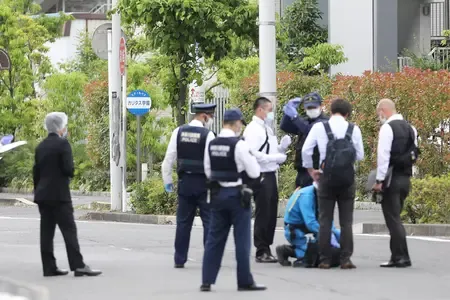Congo President Abruptly Ends Foreign Trip as M23 Seizes Key Airport
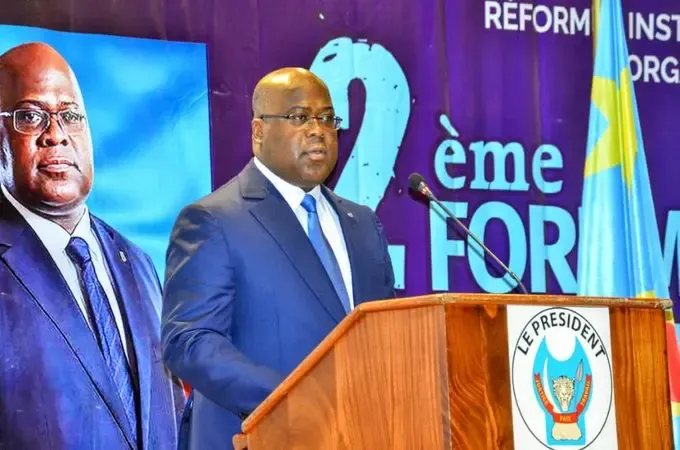
Synopsis
Key Takeaways
- Felix Tshisekedi curtailed his foreign visit.
- M23 claims to have taken Kavumu Airport.
- Kavumu is a critical supply hub for Bukavu.
- Concerns over civilian safety grow as M23 advances.
- Over 500,000 people displaced amid rising violence.
Kinshasa, Feb 15 (NationPress) The President of the Democratic Republic of the Congo (DRC), Felix Tshisekedi, has opted to truncate his overseas engagement after the March 23 Movement (M23) armed faction announced its takeover of a vital airport near Bukavu, a significant urban center in eastern DRC.
Tshisekedi, currently attending the Munich Security Conference in Germany, plans to return earlier than scheduled on Saturday, as reported by local news outlets. His choice comes on the heels of M23's declaration that they have secured Kavumu Airport, a key humanitarian and military logistics center in the eastern South Kivu Province, according to Xinhua news agency.
According to M23 spokesperson Laurence Kanyuka, "Kavumu Airport posed a threat to the civilian populace in liberated areas and our strategic positions. Henceforth, Kavumu and its vicinity, including the airport, are firmly under our control," in a statement posted on X.
This airport serves as a last defensive line for Bukavu, which is approximately 30 km away. Local reports to Xinhua indicated that M23 forces have been advancing towards the city, contradicting earlier claims by the group in February that they had no plans to take Bukavu.
During a panel discussion at the Munich Security Conference on Friday, Tshisekedi stated, "We will not allow ourselves to be bullied; we will take full responsibility. If my country is being blatantly attacked today and the world remains largely indifferent, it undermines international law completely."
The recent offensive by M23 follows their earlier claim of capturing Goma, the capital of North Kivu Province, on January 26. Since the beginning of this week, M23 has taken control of multiple towns in South Kivu, inciting fear among residents of Bukavu.
As of Friday afternoon, sources from South Kivu reported that the rebels were making progress towards Bukavu, while certain DRC military personnel and their allies retreated towards Uvira, an essential commercial and transport hub bordering Burundi.
Civil society organizations published a letter on Wednesday urging the authorities to refrain from engaging in combat in Bukavu to avoid civilian casualties.
The eastern DRC has experienced a surge in violence as M23 escalates its offensives. Since late 2021, they have taken control of several vital locations, including the border town of Bunagana and the mining area of Rubaya, renowned for its rich coltan resources.
On Friday, Tina Salama, spokesperson for Tshisekedi, confirmed that the DRC president would skip this weekend's African Union (AU) Summit, with Prime Minister Judith Suminwa Tuluka representing him in Addis Ababa, the capital of Ethiopia.
In addition to the AU Summit, Tshisekedi has missed several other significant regional discussions regarding the crisis in eastern DRC, including a "historic summit" held last week by the East African Community and the Southern African Development Community in Dar es Salaam, Tanzania.
The AU's Peace and Security Council was scheduled to address the DRC crisis in a high-level meeting in Addis Ababa on Friday, followed by a press conference later in the day.
The ongoing conflict pitting M23 against the Congolese government is deeply rooted in the aftermath of the 1994 Rwandan genocide and enduring ethnic tensions between the Tutsi and Hutu groups.
The DRC accuses Rwanda of supporting M23, while Rwanda contends that the Congolese army has allied with the Democratic Forces for the Liberation of Rwanda, a rebel group implicated in the genocide against the Tutsi.
In recent weeks, the humanitarian situation in eastern DRC has drastically worsened. Since January 26, over 3,000 individuals have lost their lives, 2,880 have sustained injuries, and more than 500,000 have been displaced, adding to the existing 6.4 million people already internally displaced in the region, as per the United Nations.


